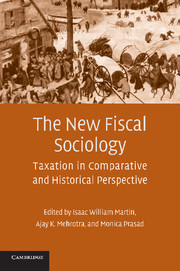Book contents
- Frontmatter
- Contents
- List of Contributors
- Acknowledgments
- Foreword
- 1 The Thunder of History: The Origins and Development of the New Fiscal Sociology
- PART ONE SOCIAL SOURCES OF TAXATION: AMERICAN TAX POLICY IN COMPARATIVE PERSPECTIVE
- PART TWO TAXPAYER CONSENT
- PART THREE THE SOCIAL CONSEQUENCES OF TAXATION
- 10 Extraction and Democracy
- 11 Improving Tax Administration in Contemporary African States: Lessons from History
- 12 Adam Smith and the Search for an Ideal Tax System
- 13 Where's the Sex in Fiscal Sociology?: Taxation and Gender in Comparative Perspective
- 14 The Shoup Mission to Japan: Two Political Economies Intersect
- Epilogue: A Renaissance for Fiscal Sociology?
- References
- Index
Epilogue: A Renaissance for Fiscal Sociology?
Published online by Cambridge University Press: 13 January 2010
- Frontmatter
- Contents
- List of Contributors
- Acknowledgments
- Foreword
- 1 The Thunder of History: The Origins and Development of the New Fiscal Sociology
- PART ONE SOCIAL SOURCES OF TAXATION: AMERICAN TAX POLICY IN COMPARATIVE PERSPECTIVE
- PART TWO TAXPAYER CONSENT
- PART THREE THE SOCIAL CONSEQUENCES OF TAXATION
- 10 Extraction and Democracy
- 11 Improving Tax Administration in Contemporary African States: Lessons from History
- 12 Adam Smith and the Search for an Ideal Tax System
- 13 Where's the Sex in Fiscal Sociology?: Taxation and Gender in Comparative Perspective
- 14 The Shoup Mission to Japan: Two Political Economies Intersect
- Epilogue: A Renaissance for Fiscal Sociology?
- References
- Index
Summary
As the editors of this volume remind us in their introduction, the comparative and historical study of taxation should be a field of considerable importance because taxes – and revenues in general – provide the means with which states implement a host of policy initiatives. Indeed, tax revenues are the “life-blood” of the modern state (Braun 1975: 243). Without them it is hard to imagine how states could sustain welfare or defense programs; maintain infrastructures like roads, airports, schools, and public transportation systems; regulate business and markets; enforce property rights and the law; or support commerce. To be blunt, without revenues it is inconceivable how states could provide the support necessary for capitalism itself.
Nevertheless, and despite the fact that influential theorists, such as Max Weber and Joseph Schumpeter, called for and did research on the subject, the field of fiscal sociology, as Schumpeter called it, has experienced somewhat of a hiatus. There are, of course, significant streams of research that investigate taxation and other means by which states generate revenue. Most obvious is the field of public finance in economics. Historians, sociologists, and political scientists have also made some contributions over the years (Campbell 1993). Yet, observers argue that the field has not yet developed into a coherent research area, by which they mean presumably that it has not yet established a unifying theoretical perspective or identified essential debates (Swedberg 2003: 178–9).
- Type
- Chapter
- Information
- The New Fiscal SociologyTaxation in Comparative and Historical Perspective, pp. 256 - 266Publisher: Cambridge University PressPrint publication year: 2009
- 5
- Cited by



